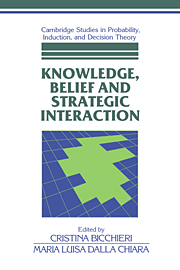Book contents
- Frontmatter
- Contents
- Preface
- List of contributors
- 1 Feasibility
- 2 Elicitation for games
- 3 Equilibrium, common knowledge, and optimal sequential decisions
- 4 Rational choice in the context of ideal games
- 5 Hyperrational games: Concept and resolutions
- 6 Equilibria and the dynamics of rational deliberation
- 7 Tortuous labyrinth: Noncooperative normal-form games between hyperrational players
- 8 On consistency properties of some strongly implementable social choice rules with endogenous agenda formation
- 9 Algorithmic knowledge and game theory
- 10 Possible worlds, counterfactuals, and epistemic operators
- 11 Semantical aspects of quantified modal logic
- 12 Epistemic logic and game theory
- 13 Abstract notions of simultaneous equilibrium and their uses
- 14 Representing facts
- 15 Introduction to metamoral
- 16 The logic of Ulam's games with lies
- 17 The acquisition of common knowledge
- 18 The electronic mail game: Strategic behavior under “almost common knowledge”
- 19 Knowledge-dependent games: Backward induction
- 20 Common knowledge and games with perfect information
- 21 Game solutions and the normal form
- 22 The dynamics of belief systems: Foundations versus coherence theories
- 23 Counterfactuals and a theory of equilibrium in games
6 - Equilibria and the dynamics of rational deliberation
Published online by Cambridge University Press: 05 November 2011
- Frontmatter
- Contents
- Preface
- List of contributors
- 1 Feasibility
- 2 Elicitation for games
- 3 Equilibrium, common knowledge, and optimal sequential decisions
- 4 Rational choice in the context of ideal games
- 5 Hyperrational games: Concept and resolutions
- 6 Equilibria and the dynamics of rational deliberation
- 7 Tortuous labyrinth: Noncooperative normal-form games between hyperrational players
- 8 On consistency properties of some strongly implementable social choice rules with endogenous agenda formation
- 9 Algorithmic knowledge and game theory
- 10 Possible worlds, counterfactuals, and epistemic operators
- 11 Semantical aspects of quantified modal logic
- 12 Epistemic logic and game theory
- 13 Abstract notions of simultaneous equilibrium and their uses
- 14 Representing facts
- 15 Introduction to metamoral
- 16 The logic of Ulam's games with lies
- 17 The acquisition of common knowledge
- 18 The electronic mail game: Strategic behavior under “almost common knowledge”
- 19 Knowledge-dependent games: Backward induction
- 20 Common knowledge and games with perfect information
- 21 Game solutions and the normal form
- 22 The dynamics of belief systems: Foundations versus coherence theories
- 23 Counterfactuals and a theory of equilibrium in games
Summary
A first fundamental merit of von Neumann and Morgenstern's work lies in the decisive push it has given for the establishment of the criterion of maximization of expected utility as a universal criterion of decision.… Actually, it seems that the best advice in order to make good (and never bad) use of game theory lies in going back to such decision theory.
B. de Finetti, “John von Neumann e Oskar Morgenstern,” II Maestri Dell'Economica ModernaINTRODUCTION
De Finetti (1970) and Ramsey (1931) showed how rational decision is founded on coherence. This should be true in game-theoretic contexts just as much as in other ones. If followed to their logical conclusion, considerations of coherence can lead to dynamic deliberation and in this context introduce a natural equilibrium concept. Such deliberational equilibria are intimately connected with game-theoretic equilibria in games played by dynamic deliberators.
In the simplest cases deliberation is trivial; one calculates expected utility and maximizes. But in more interesting cases, the very process of deliberation may generate information that is relevant to the evaluation of the expected utilities. Then, processing costs permitting, a Bayesian deliberator will feed back that information and recalculate the expected utilities in light of the new knowledge.
In this type of decision problem, deliberation can be modeled as a dynamic system. The decision maker starts in a state of indecision; calculates expected utility; moves in the direction of maximum expected utility; feeds back the information generated and recalculates; and so forth.
- Type
- Chapter
- Information
- Knowledge, Belief, and Strategic Interaction , pp. 93 - 106Publisher: Cambridge University PressPrint publication year: 1992
- 1
- Cited by



